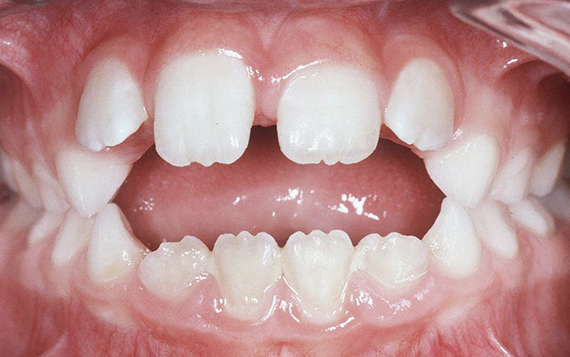-- Take the family on a weeklong vacation to Disney World
-- Buy all new living room furniture
-- Hire a personal sous chef for three months
OR
-- Allow your child to suck her thumb so that a $7000+ braces bill is in your future.
And So It Begins...
Children first discover their thumbs in utero. Ultrasound images provide evidence that thumb sucking can begin as early as 10 weeks old. A few months after birth, thumb sucking may return as a way for babies to soothe themselves. For many children, it's a harmless habit that often stops between ages 2-4 years old.
Thumbs Gone Wild
As children mature, they develop other coping strategies to deal with anxiety and stress, like language development, Every child is different and some continue thumb sucking into the elementary school years.
Besides the embarrassment older children fear should their habit be discovered by peers, there are serious health consequences of prolonged thumb sucking: distorted positions of adult teeth, incomplete development of the jaws, and complicated speech development. Other harmful effects are:
• Narrowing of the upper jaw and palate.
• Protrusion of the upper front teeth.
• Crowding of the lower front teeth.
• An "open-bite" of the front teeth (a large opening between the upper and lower front teeth).
• Development of a long narrow face.
• Mouth breathing.
• Tongue thrusting swallow.
The Destructive Digit
Thumb sucking can cause the cheeks to tighten up against the teeth in the back of the mouth, with a resulting narrowing of the upper jaw and palate. A narrow palate means a narrower nasal cavity which can lead to mouth breathing, a long narrow face and may contribute to sleep apnea.
The thumb pushes the upper front teeth forward (causing spacing and protrusion, aka "buck teeth") and the lower front teeth backward (causing crowding). The open bite can contribute to lisping. One finger can have immediate and long term life-altering facial development consequences.
See photo of effects of thumb sucking:
Rules of Thumb
Pediatric dentists and orthodontists often recommend that thumb sucking stop before the permanent front incisor teeth erupt at around age 7. Usually, any dental distortions of the baby teeth won't transfer to the newly erupting incisors if the thumb has been evicted. Any narrowing of the upper jaw however may persist and require orthodontic expansion treatment. So ideally, finger sucking habits should cease by age 4.
Happy Endings
Your child's thumbsucking habit must be addressed intelligently and with sensitivity. Your pediatrician and pediatric dentist are great resources for advice, as well as their professional associations' websites:
Different strategies to extinguish oral habits include behavior modification, and oral appliances. If caught early enough, many times the adverse changes will reverse completely. Consulting with a pediatric dentist or an orthodontist will provide the best solution.
When Bad Thumb Sucking Happens to Good Kids
If your child's thumb claimed squatter's rights for too long, orthodontic treatment may be necessary to correct the damage.
This typically involves two stages of treatment:
• Habit elimination and palate expansion as soon as possible
• Comprehensive treatment with braces at a later age
Bottom line: Get the thumbs out of their mouths and take your family to Disney World instead.
